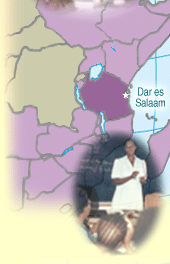
Improving District-Level Reproductive and Child Health Care
With funding from USAID/Tanzania, PRIME II assisted the Ministry of Health (MOH) in its ongoing initiative to establish high-quality reproductive and child health (RCH) services at the district level. PRIME’s involvement took shape after Tanzanian health care leaders were inspired by a short course on the Performance Improvement (PI) approach that PRIME II taught at the Regional Centre for Quality of Health Care at Makerere University in Uganda. As a result, the MOH’s Reproductive and Child Health Section (RCHS) adopted PI to improve decentralized RCH services, in which Zonal Training Centers (ZTCs) play an important role.
In late 2000, PRIME II coordinated a performance needs assessment for all ZTCs in Tanzania, using pre-established indicators to gauge ZTC capacity. The PNA revealed low baseline scores in five key performance dimensions, especially in capacity for RCH training (12%) and partnering with districts (44%). The results were used to strengthen two ZTCs—Centre for Education and Development in Health (Arusha) and the Primary Health Care Institute (Iringa)—to support district expansion of RCH services. PRIME also assisted RCHS to expand and improve family planning (FP) and postabortion care (PAC) services, and to oversee district application of the PI approach. PI has been used in nine of 16 districts to plan and manage in-service training and non-training interventions to improve services.
Key Results: At the ZTCs in Arusha and Iringa, performance reached the optimal level (100%) in all five performance dimensions. The ZTCs and the Regional Health Management Team, which did not work together before 2001, have formed a strong partnership to respond to district needs; with support from PRIME, the ZTCs and RHMT coordinated district-level training in RCH counseling and infection prevention practices for 100 providers from more than 50 facilities. At the national level, PRIME helped to update and standardize the PAC curriculum. Manual vacuum aspiration kits are now on the government’s essential equipment list and 18 trainers (90% of the target) trained 72 providers to offer PAC services at 28 sites. PRIME also pre-tested ten FP manuals intended for nationwide use; as a result of the pre-test, 20 trainers from 19 regions and 375 providers have updated competencies in FP.
|











